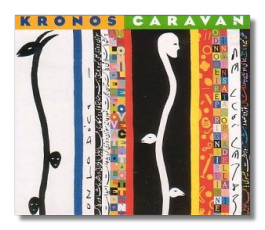
The Internet's Premier Classical Music Source
Related Links
- Latest Reviews
- More Reviews
-
By Composer
-
Collections
DVD & Blu-ray
Books
Concert Reviews
Articles/Interviews
Software
Audio
Search Amazon
Recommended Links
Site News
 CD Review
CD Review
Kronos Caravan

Kronos Quartet and friends
Nonesuch 79490-2 DDD 62:45
The Kronos Quartet is back with another album that's more unclassifiable than classical. This time, they've brought along some friends, and also a new cellist, Jennifer Culp. (Apparently Joan Jeanrenaud left the ensemble in 1999.)
The CD takes its title from a quotation by Pandit Pran Nath: "Souls travel in caravans." The music on Kronos Caravan comes from souls from all over, but if one had to point to geographical ground zero, one might identify the ill-defined territory that separates Europe from Asia. The composers of these 12 tracks were born in Yugoslavia, Portugal, India, Mexico, Romania, Hungary, California, Argentina, Iran, and Lebanon. Unity is provided by the arrangements of Osvaldo Golijov, an eclectic Argentinean composer who also has written original music for Kronos.
Kronos has invited an international team of musicians to assist them with their unpredictable itinerary. Different tracks include the Indian tabla, a galvanizing Romanian folk ensemble named Taraf de Haïdouks, the nay and the tar from Lebanon, and the kamancheh and the tombak from Iran. The last track, which might be described as the "authentic version" of the surf-music standard Misirlou, features a drummer from Liverpool. Did you know that California surf-guitar style may have been influenced by Armenian music? It says so in the booklet notes, but you won't believe it until you hear Misirlou Twist.
Angsty types will be "happy" to see that Kronos and Golijov offer up an arrangement of the famous "Hungarian suicide song," originally by a man named Rezsö Seress who, yes, committed suicide in 1968. Gloomy Sunday has dispatched untold numbers of gloomy people since it appeared more than fifty years ago, and the version presented here is appropriately glum.
If you need to be cheerful again, turn to Turceasca, Kronos's jam session with Taraf de Haïdouks. The title means "Turkish Song," although the composer, Sapo Perapaskero, was born in Romania. Historically, the Turks overran Perapaskero's homeland more than once, so the conjunction isn't too surprising. Kronos and the "gypsy collective" break a sweat and then some on this track, and you may be whirling like the proverbial dervish by the time that it's over.
Because this isn't really a classical album, don't expect classical playing from Kronos; they squeal, squawk, groan, keen, and wail, and they get the job done. It is fun to hear them pushing themselves farther than ever before. As for the listener, this CD is entertaining and mind-expanding. Kronos Caravan may be an example of multiculturalism, but it's more than just an empty exercise in political correctness.
Currently, the Kronos Quartet is touring with material from this album. Nonesuch artist Dawn Upshaw, who sang with them on the Night Prayers CD, is their partner.
Copyright © 2000, Raymond Tuttle




















